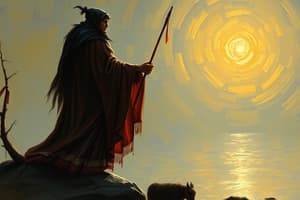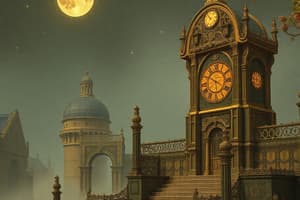Podcast
Questions and Answers
What are the key elements of world-building in fantasy stories?
What are the key elements of world-building in fantasy stories?
- Culture, magic, and technology
- History, technology, and mythical creatures
- Geography, history, and magic (correct)
- Geography, culture, and mythical creatures
Which of the following is NOT an example of a mythical creature mentioned in the text?
Which of the following is NOT an example of a mythical creature mentioned in the text?
- Trolls
- Unicorns
- Wraiths (correct)
- Griffins
In fantasy stories, what are wands typically used for?
In fantasy stories, what are wands typically used for?
- To communicate with mythical creatures
- As weapons
- To cast spells (correct)
- To fly
What are runes used for in the context of magic in fantasy stories?
What are runes used for in the context of magic in fantasy stories?
What is a central element in many fantasy stories, serving as a source of power and wonder?
What is a central element in many fantasy stories, serving as a source of power and wonder?
Study Notes
The Fantasy Genre: A World of Imagination and Adventure
The fantasy genre is a popular and diverse literary category that captures the imagination of readers with its magical, mythical, and mystical elements. Fantasy stories often transport readers to otherworldly realms filled with adventure, danger, and wonder. As students delve into the features of fantasy stories and the main concepts of these tales, they uncover the intricate layers of world-building, heroic journeys, mythical creatures, and magical systems that define this captivating genre.
The Hero's Journey
At the heart of many fantasy stories lies the hero's journey, a narrative structure that follows a protagonist on an epic quest. This journey typically involves a series of trials and challenges that test the hero's courage, strength, and resolve. Some of the most iconic elements of the hero's journey include:
- The Call to Adventure: The hero is faced with a challenge or opportunity that sets them on their path.
- Mentors and Allies: The hero gathers companions who guide and support them through their journey.
- Trials and Challenges: The hero encounters obstacles and adversaries that must be overcome to achieve their goal.
- Climax: The hero faces their greatest challenge or adversary in a final showdown.
- Resolution: The hero returns from their journey, often transformed by the experiences and challenges they faced.
World-Building
Creating a believable and immersive fantasy world is a crucial aspect of crafting a captivating story. World-building involves designing the geography, culture, history, and rules of the fantasy world. This process can be as simple as creating a single village or as complex as building an entire continent. Key elements of world-building include:
- Geography: The physical landscape of the world, including mountains, rivers, and forests.
- Culture: The customs, traditions, and social structure of the world's inhabitants.
- History: The background and events that have shaped the world and its people.
- Magic: The rules and systems governing the use of magical powers in the world.
- Technology: The level of advancement and the tools available to the world's inhabitants.
Mythical Creatures
Fantasy stories are often populated with a wide array of mythical creatures, from dragons and unicorns to goblins and trolls. These creatures can serve as antagonists, allies, or even central characters in the story. Some examples of mythical creatures include:
- Dragons: Large, powerful reptiles that can breathe fire or other elemental breaths.
- Unicorns: Mythical horses with a single, spiraling horn on their forehead.
- Goblins: Small, mischievous creatures often depicted as having green skin and pointed ears.
- Trolls: Large, hulking creatures that can be found in forests or under bridges, often guarding treasure.
- Griffins: Mythical creatures with the body of a lion and the head and wings of an eagle.
Magic
Magic is a central element in many fantasy stories, serving as a source of power and wonder. Magic systems can range from being unpredictable and chaotic to being strictly governed by rules and laws. Some examples of magic in fantasy stories include:
- Spells: Verbal or written incantations that can be used to manipulate the environment or control other magical forces.
- Wands: Conduit objects that channel magical energy from the user to the target.
- Staffs: Long, wooden or metal-tipped sticks that can be used to focus and direct magical energy.
- Runes: Symbols or markings that can be inscribed on objects or drawn in the air to create magical effects.
As students explore the fantasy genre and its various subtopics, they gain a deeper understanding of the intricate worlds and captivating stories that define this imaginative literary category. Whether it's the epic hero's journey, the intricate world-building, the mysterious mythical creatures, or the powerful magic systems, the fantasy genre offers a wealth of knowledge and inspiration for readers of all ages.
Studying That Suits You
Use AI to generate personalized quizzes and flashcards to suit your learning preferences.
Description
Delve into the captivating world of fantasy literature with this quiz, exploring the hero's journey, world-building, mythical creatures, and magic systems that define the genre. Gain a deeper understanding of the intricate storytelling elements and imaginative concepts that make the fantasy genre so compelling.




